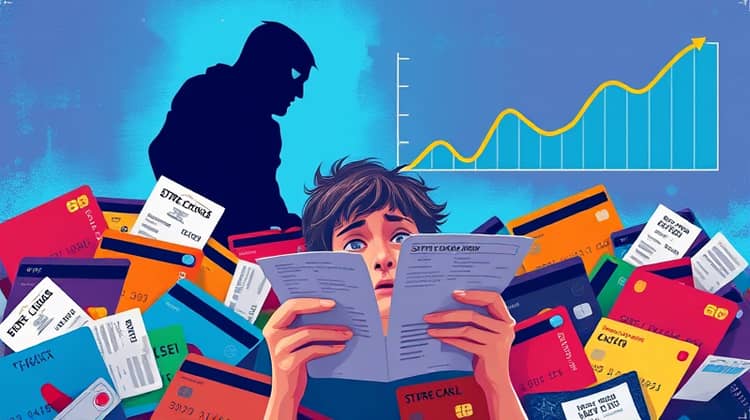Managing finances can be challenging, especially with various credit options available to consumers. One of these options is a store credit card, which can offer unique benefits for frequent shoppers. However, before deciding whether to apply for one, it is important to weigh the potential pros and cons that come with these cards.
Store credit cards are designed to enhance customer loyalty by offering perks such as discounts, rewards, or special financing options. These incentives can make shopping at a particular store more appealing, particularly for regular shoppers. Yet, these cards can also lead to complicated financial decisions if not managed wisely, which often traps individuals in cycles of debt.
This article will explore the various advantages and disadvantages of store credit cards, as well as the key factors to consider before obtaining one. Additionally, we will provide tips for managing these cards responsibly. By the end of this discussion, you will have a clearer picture of whether a store credit card is the right choice for your financial situation.
The Pros of Store Credit Cards

There are several advantages to owning a store credit card, particularly if you frequently shop at specific retailers. One of the most notable benefits is the exclusive discounts and promotional offers that cardholders often receive. These offers can aid in reducing overall shopping costs, especially during sales events or holiday seasons.
Additionally, many store credit cards provide cashback options or rewards points for every dollar spent. Over time, these rewards can accrue and lead to significant savings or even free products, which makes the card more valuable for dedicated shoppers.
- Exclusive discounts on purchases
- Special financing options for larger purchases
- Rewards points or cashback for every purchase
- Easier approval process compared to traditional credit cards
Ultimately, store credit cards can provide an array of financial benefits for consumers who consistently shop at specific retailers and manage their credit wisely.
The Cons of Store Credit Cards

Despite the appealing perks, store credit cards come with notable downsides. One significant drawback is the high-interest rates associated with many of these cards. If you carry a balance, the interest accrued can quickly offset any rewards or discounts you may gain from using the card.
Additionally, relying too heavily on store credit cards can harm your overall credit score. Having too many accounts with high utilization ratios can indicate financial instability to lenders, which may affect your ability to secure loans or obtain other forms of credit in the future.
- High-interest rates on unpaid balances
- Limited usability compared to general credit cards
- Potential damage to credit score from excessive inquiries
- Targeted rewards may not align with your spending habits
Considering these factors is crucial when deciding whether to apply for a store credit card, as the disadvantages can sometimes overshadow the benefits if not managed carefully.
Factors to Consider Before Getting a Store Credit Card

Before applying for a store credit card, there are essential factors to contemplate that can impact your overall financial health. Firstly, examine how often you shop at the retailer in question. If you make frequent purchases, the benefits may outweigh the potential downsides, leading to valuable rewards and discounts.
Moreover, look into the interest rates and fees associated with the card. Understanding these fees can save you money and prevent unforeseen financial issues down the line. Always ensure that the card aligns with your budgeting strategy and spending habits.
- Evaluate your shopping frequency at the retailer
- Analyze the card's interest rate and fees
- Consider your overall credit card usage
- Think about your ability to pay off balances promptly
By reflecting on these factors, you can make a more informed decision about whether a store credit card is the right tool for managing your expenses and saving money.
How to Manage a Store Credit Card Responsibly

If you decide to get a store credit card, proper management is essential to maximize its benefits and minimize negative consequences. First and foremost, always make payments on time, as late fees can be steep and impact your credit score. Setting reminders or automating payments can be a valuable tactic in this regard.
Additionally, keeping track of your spending is crucial to avoid accumulating debt. Establishing a budget that includes your store credit card purchases will help you stay on top of your finances and ensure you don't overspend.
- Set up reminders for payment due dates
- Create a budget for your store credit card spending
- Regularly review your statements for unauthorized charges
- Pay the full balance each month to avoid interest
By following these guidelines, you can enjoy the benefits of a store credit card while minimizing the risks associated with credit card debt.
Conclusion

In conclusion, store credit cards can provide valuable perks for frequent shoppers, including discounts and rewards that enhance their shopping experience. However, these benefits can be counterbalanced by high-interest rates and potential damage to credit scores if not managed correctly. Thus, making an informed decision is essential before applying for such credit.
Understanding your shopping habits, financial stability, and how you plan to use the card are all critical components of the decision-making process. Balancing these factors will help you determine if a store credit card fits into your overall financial strategy.
Ultimately, for those who can manage their expenses wisely and appreciate the rewards, a store credit card can be a beneficial addition. However, careful consideration is paramount to ensure that the advantages outweigh the disadvantages and contribute positively to your financial health.














